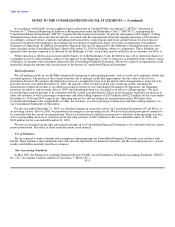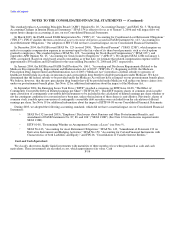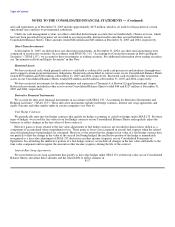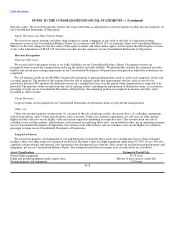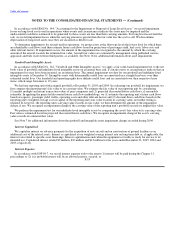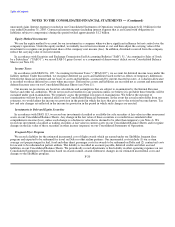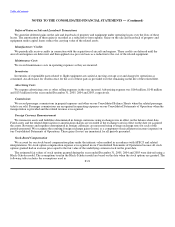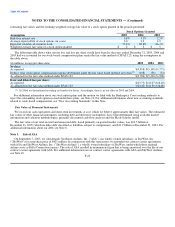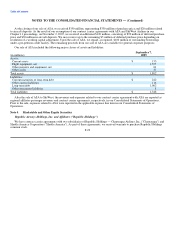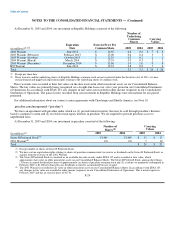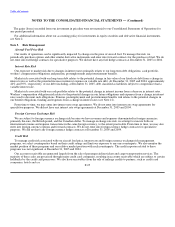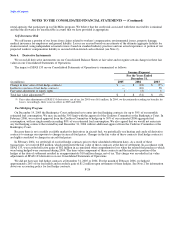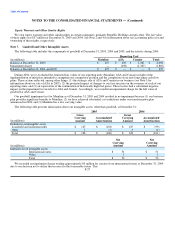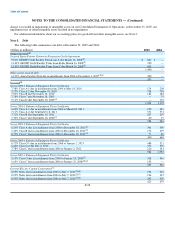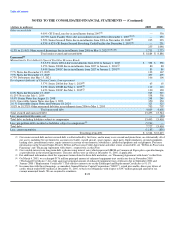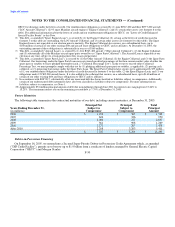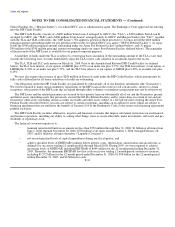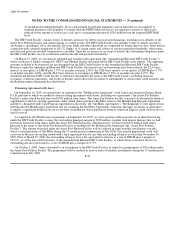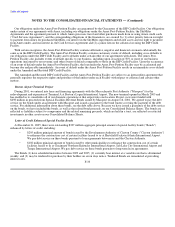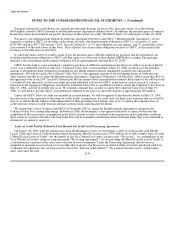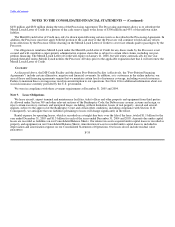Delta Airlines 2005 Annual Report Download - page 87
Download and view the complete annual report
Please find page 87 of the 2005 Delta Airlines annual report below. You can navigate through the pages in the report by either clicking on the pages listed below, or by using the keyword search tool below to find specific information within the annual report.
Table of Contents
NOTES TO THE CONSOLIDATED FINANCIAL STATEMENTS — (Continued)
The gains (losses) recorded from our investment in priceline were not material to our Consolidated Statements of Operations for
any period presented.
For additional information about our accounting policy for investments in equity securities and derivative financial instruments,
see Note 2.
Note 5. Risk Management
Aircraft Fuel Price Risk
Our results of operations can be significantly impacted by changes in the price of aircraft fuel. To manage this risk, we
periodically purchase options and other similar derivative instruments and enter into forward contracts for the purchase of fuel. We do
not enter into fuel hedge contracts for speculative purposes. We did not have any fuel hedge contracts at December 31, 2005 or 2004.
Interest Rate Risk
Our exposure to market risk due to changes in interest rates primarily relates to our long-term debt obligations, cash portfolio,
workers' compensation obligations and pension, postemployment and postretirement benefits.
Market risk associated with our long-term debt relates to the potential change in fair value of our fixed rate debt from a change in
interest rates as well as the potential increase in interest expense on variable rate debt. At December 31, 2005 and 2004, approximately
44% and 39%, respectively, of our debt (including, at December 31, 2005, debt classified as liabilities subject to compromise) had a
variable interest rate.
Market risk associated with our cash portfolio relates to the potential change in interest income from a decrease in interest rates.
Workers' compensation obligation risk relates to the potential changes in our future obligations and expenses from a change in interest
rates used to discount such obligations. Pension, postemployment and postretirement benefits risk relates to the potential changes in
our benefit obligations, funding and expenses from a change in interest rates (see Note 12).
From time to time, we may enter into interest rate swap agreements. We do not enter into interest rate swap agreements for
speculative purposes. We did not have any interest rate swap agreements at December 31, 2005 and 2004.
Foreign Currency Exchange Risk
We are subject to foreign currency exchange risk because we have revenues and expenses denominated in foreign currencies,
primarily the euro, the British pound, and the Canadian dollar. To manage exchange rate risk, we attempt to execute both our
international revenue and expense transactions in the same foreign currency, to the extent practicable. From time to time, we may also
enter into foreign currency options and forward contracts. We do not enter into foreign currency hedge contracts for speculative
purposes. We did not have any foreign currency hedge contracts at December 31, 2005 and 2004.
Credit Risk
To manage credit risk associated with our aircraft fuel price, interest rate and foreign currency exchange risk management
programs, we select counterparties based on their credit ratings and limit our exposure to any one counterparty. We also monitor the
market position of these programs and our relative market position with each counterparty. The credit exposure related to these
programs was not significant at December 31, 2005 and 2004.
Our accounts receivable are generated largely from the sale of passenger airline tickets and cargo transportation services. The
majority of these sales are processed through major credit card companies, resulting in accounts receivable which are subject to certain
holdbacks by the credit card processors. We also have receivables from the sale of mileage credits to partners, such as credit card
companies, hotels and car F-25


